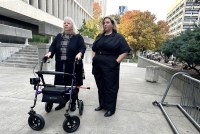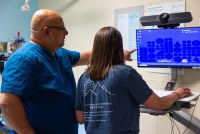Latest KFF Health News Stories
Most States Ban Shackling Pregnant Women in Custody, Yet Many Report Being Restrained
Advocates for pregnant people in police custody say repeated incidents show prohibitions on handcuffs and other restraints are little more than lip service.
Beyond Insulin: Medi-Cal Expands Patient Access to Diabetes Supplies
California’s Medicaid program is making it easier for people with diabetes to obtain the supplies and equipment they need to manage their blood sugar, partly by relaxing preauthorization requirements that can cause life-threatening delays.
It’s Getting Harder to Find Long-Term Residential Behavioral Health Treatment for Kids
Intermountain Residential in Montana is one of the only facilities in the United States that offer long-term residential behavioral treatment for kids as young as four. Now, administrators say they’re not sure how long it can keep its doors open.
Legisladores de Texas, Florida y otros estados socavan esfuerzos de vacunación contra covid
El cambio en la información sobre salud sigue la retórica de políticos, principalmente republicanos, que han dado marcha atrás en sus posturas sobre las vacunas de covid.
The Unusual Way a Catholic Health System Is Wielding an Abortion Protest Law
Dignity Health is suing several patients and their advocates for “commercial blockade” for refusing discharge during the covid-19 pandemic. The lawsuits could set precedents for use of the California commercial blockade statute, conceived to constrain abortion protesters, and how hospitals handle discharges.
Adult Children Discuss the Trials of Caring for Their Aging Parents
The financial and emotional toll of providing and paying for long-term care is wreaking havoc on the lives of millions of Americans. Read about how a few families are navigating the challenges, in their own words.
Why It’s So Tough to Reduce Unnecessary Medical Care
Treatments that don’t help patients, and may even harm them, are difficult to eliminate because they can be big sources of revenue.
How Lawmakers in Texas and Florida Undermine Covid Vaccination Efforts
State legislatures and politicians are pressuring public health officials to keep quiet about covid vaccines.
What the Health? From KFF Health News: A Very Good Night for Abortion Rights Backers
Abortion rights backers won major victories in at least five states in the 2023 off-year elections Nov. 7, proving the staying power of abortion as a political issue in the wake of the Supreme Court’s 2022 decision overturning Roe v. Wade. Meanwhile, the National Institutes of Health finally has a new director, after Democrats temporarily blocked President Joe Biden’s nominee over a mostly unrelated fight about prescription drug prices. Alice Miranda Ollstein of Politico, Tami Luhby of CNN, and Sandhya Raman of CQ Roll Call join KFF Health News’ Julie Rovner to discuss these issues and more. Also this week, Rovner interviews KFF Health News’ Julie Appleby, who reported and wrote the latest “Bill of the Month” feature.
Underdiagnosed and Undertreated, Young Black Males With ADHD Get Left Behind
A recent study found that young Black males are substantially more likely to be underdiagnosed and undertreated for the neurological condition than white peers.
A New RSV Shot Could Help Protect Babies This Winter — If They Can Get It in Time
Supply problems, a high price tag, and bureaucratic obstacles are slowing the distribution of a therapy that can protect infants from the respiratory syncytial virus. That will leave them unnecessarily at risk of hospitalization this winter, pediatricians fear.
Ohio votó a favor del aborto. Podrían seguir otros 11 estados el próximo año
El impulso para llevar el polémico tema a los votantes llega después de la serie de victorias en las votaciones del año pasado a favor del derecho al aborto en seis estados: California, Kansas, Kentucky, Michigan, Montana y Vermont.
Ohio Voted on Abortion. Next Year, 11 More States Might, Too.
Ohio is the latest state where voters have directly weighed in on abortion, and the next wave of such ballot measures is in the works in at least 11 other states, including Missouri.
US to Cover HIV Prevention Drugs for Older Americans to Stem Spread of the Virus
The government has proposed that Medicare fully cover preexposure prophylaxis drugs that prevent HIV, a change that could help America catch up with nations in Europe and Africa that are on track to end new infections decades before the U.S. under its current approach.
Nueva ley de California ofrece protección contra facturas por viajes en ambulancia
En California, casi tres cuartas partes de los traslados de emergencia en ambulancia generan facturas fuera de la red. La factura sorpresa promedio es de $1,209, la más alta del país
Ohio Votes on Abortion Rights Today. Eleven States May Follow in 2024.
Voters in Ohio are deciding whether to add abortion rights protections to the state’s constitution today. The vote comes on the heels of last year’s string of ballot measure wins for abortion rights in six states: California, Kansas, Kentucky, Michigan, Montana and Vermont. But this is just the start. Next year, 11 more states could see abortion-related […]
Iowa’s Governor Opposes Abortion — And Has Final Say on Whether Medicaid Pays for It
The federal government requires state Medicaid programs to pay for abortions in limited circumstances, but Iowa hasn’t done so for years. No providers seek Medicaid payments, which require the approval of the governor, an anti-abortion Republican.
New California Law Offers Fresh Protection From Steep Ambulance Bills
The law, which takes effect Jan. 1, prohibits out-of-network ground ambulance operators from billing patients more than they would pay for in-network rides. It also caps how much the uninsured must pay.
La resistencia a empezar más tarde tiene menos que ver con dificultades logísticas y financieras, sobre todo en aspectos básicos como el transporte escolar.
As Transgender ‘Refugees’ Flock to New Mexico, Waitlists Grow
As many states have moved to restrict or ban gender-affirming care for trans people, a few states, including New Mexico, have codified protections. But those laws don’t always mean accessing care is simple or quick, as a surge in new patients in the state collides with limited doctors and clinics.























